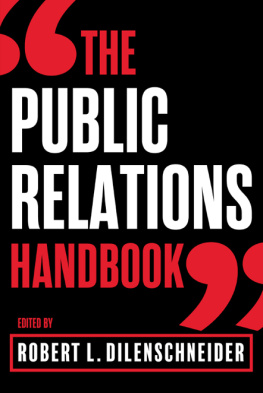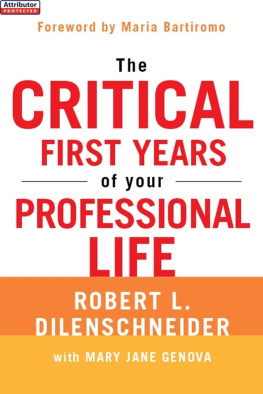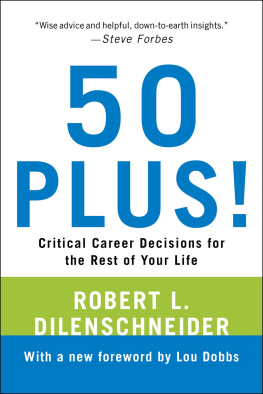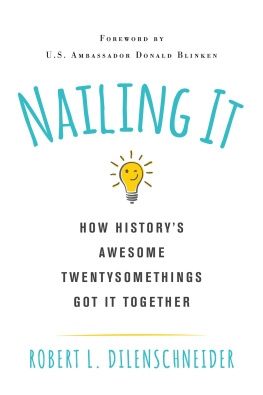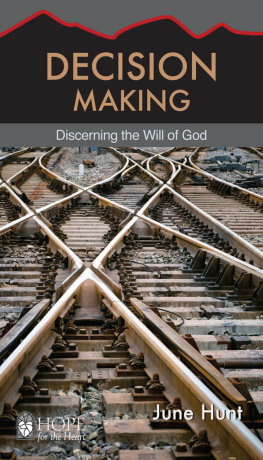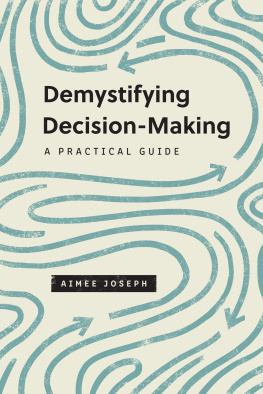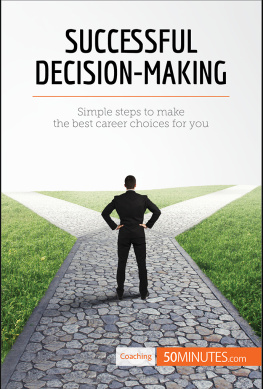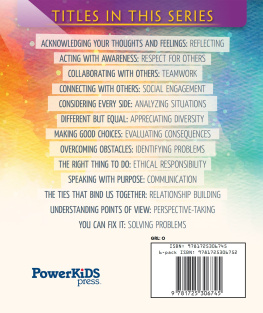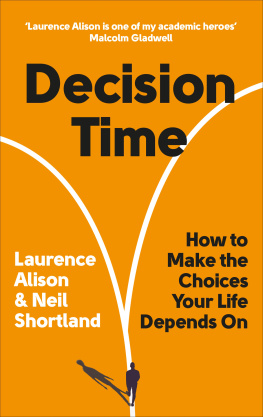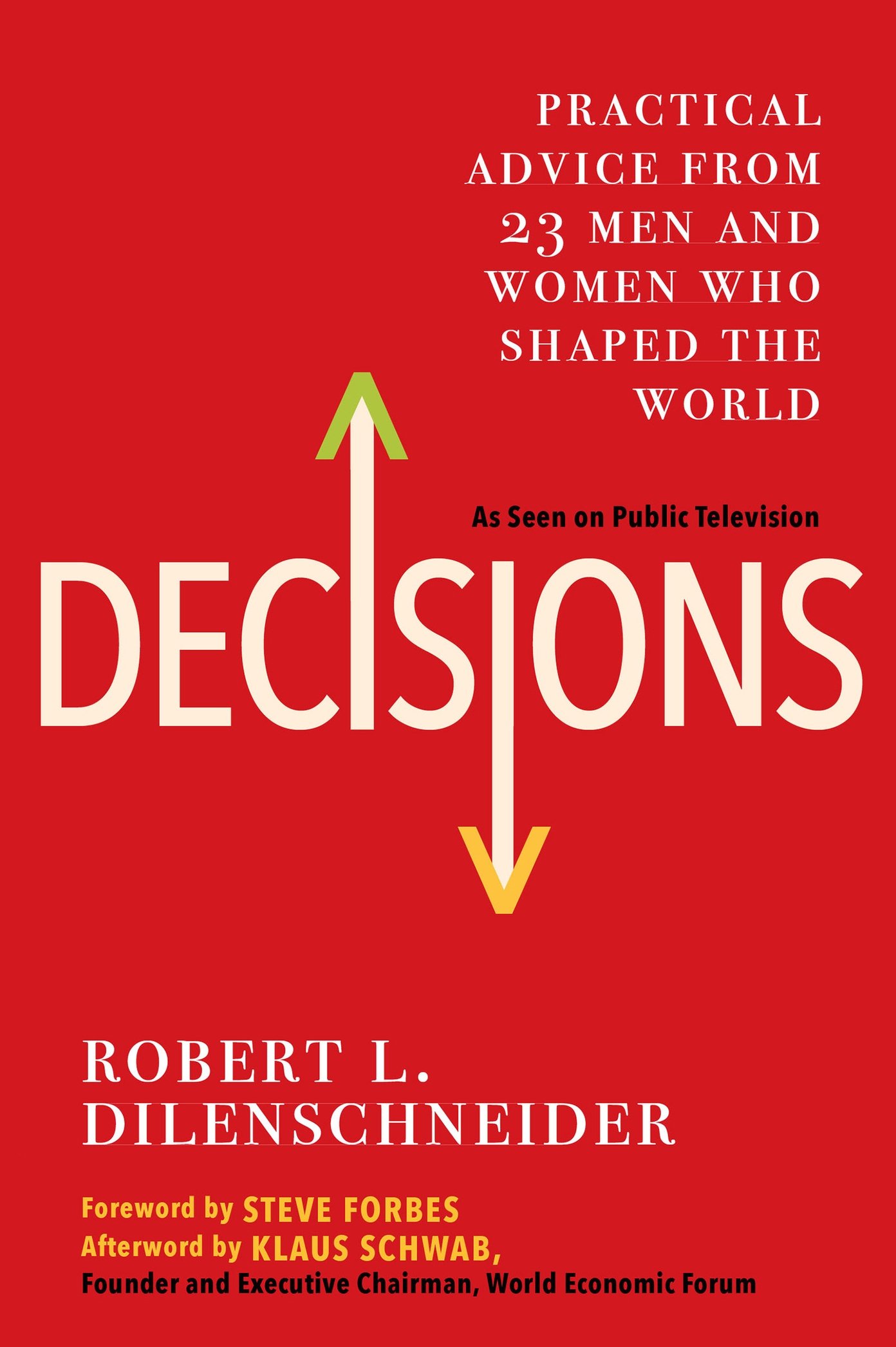ACKNOWLEDGMENTS
I wrote this book to help make life better for people.
Every day we make hundreds of decisionssome small, some significantthat mark our lives. How people make those decisions is critical to their future.
This book captures vignettes on twenty-three individuals who made decisions that shaped the world and whose stories stretch over time from 218 B.C. to right now.
There were so many that helped with this book, starting with Susan Black, a friend of more than forty years, who wrote draft after draft and who did incredible research; to Joan Ava-gliano, whom I have worked with for decades, who kept all moving in the right direction and who added value at every turn; to Michaela Hamilton, my editor, a female Maxwell Perkins, who provided insights and direction.
These three provided invaluable insights at every turn.
I owe a great debt to my friends, Steve Forbesa businessman and thinker and journalist of real caliber; and Professor Klaus Schwab, who started the World Economic Forum and who has included me in WEF events since 1983. Klaus gave me the best advice I have ever received at his club in Geneva about ten years ago. It has shaped my life.
There are many more to acknowledge and thank starting with Vito Racanelli, one of the best journalists I know, for his wisdom and insights; F. Craig Johnson, Pastor of Christ Lutheran Church in Aurora, Oregon, who was instrumental in our research on Martin Luther; Linda J. Lear, arguably the foremost authority on Rachel Carson for her time to discuss why this ecologist is so important and belongs in this book; and the staff at the Canby Public Library in Canby, Oregon.
Thank you to The Dilenschneider Group interns of 2017 for their research and thoughtful suggestions: Daniel Gross, Maximilian Meanwell, James Psathas, Peter Psathas, and Cynthia Sciabica; and to Linda Smith, Margarita Bravo, Kelly Lawrence, and Andrea Fekete who helped bring this project to a close.
Steve Zacharius, Chairman, President, and CEO at Kensington, my publisher, deserves special thanks for all he does for so many.
And, of course, thanks to my wife, Jan, who has read and given encouragement on each of my eighteen books.
No statement of acknowledgement would be complete without mention of my supportive family: Jack, my brother; Mary and Martha, my sisters; my sons, Geoffrey and Peter; and my niece, Ricia Harding.
Books by R OBERT L. D ILENSCHNEIDER
The Critical First Years of Your Professional Life*
50 Plus!*
Decisions*
The Critical 2nd Phase of Your Professional Life
Power and Influence
Civility in America
Public Relations Handbook
A Briefing for Leaders
The AMA Handbook of Public Relations
A Time for Heroes
Values for a New Generation
On Power
The Men of St. Charles
The Corporate Communications Bible
The Heros Way
*Available from Kensington Publishing Corp.
AFTERWORD
by Klaus Schwab
Founder and Executive Chairman,
World Economic Forum
As you finish reading this book, you may find yourself wondering: How could the lessons from world leaders and historical figures ever apply to my life? How could I put myself in a situation where I can change the course of history, like the people discussed in this book? And if I do ever get to such a make-or-break moment, how do I make sure I make the right choice?
It isnt necessary to put such a heavy burden on your shoulders. Ive learned that it is near impossible to predict the exact course of your own life or career, let alone that of the world at large. It is better to approach your life and career one small decision at a time and always with a positive mind-set. This approach will pay off over time. Ill give just a few examples to make the point.
At the beginning of his life, Johann Gutenberg could have never dreamt of becoming Europes leading publisher. Nor could Picasso have wanted to become the most renowned Cubist painter. Henry Ford could not have wanted to become the biggest automobile manufacturer, or Dag Hammarskjld the U.N. secretary-general. The things they later became most known for simply didnt exist yet.
Similarly, many young people today dream of becoming the CEO of a large company. You might want to walk in Bob Dilenschneiders footsteps, as he had a distinguished corporate career before becoming an acclaimed author. But he didnt become CEO because he aimed for that title when he was young: back then, the concept Chief Executive Officer didnt even exist. It only gained popularity in the 1960s.
Indeed, as you find your way in life, you shouldnt worry about how to put your name in the history books. It is much more important to live your life here and now in a way that is valuable to you and to those around you. Every day we make decisions that can positively change us. To show the courage of conviction in those recurring daily moments, as Bob wrote, is what really matters.
Take the case of Malala, whom I had the pleasure to meet. Her aim was not to become the worlds most known activist for girls education. She wanted to defend her right and that of other girls in her village to go to school. It was a goal she was willing to fight for every day, and that made a difference in her life and those around her immediatelywhether that would win her a Nobel Prize or not.
Or take the case of Pierre and Marie Curie. They didnt become Frances most successful and beloved scientists overnight. They spent many years behind their books and in their labs, before making the discoveries that would turn them into Nobel Prizewinning scientists. To paraphrase the quote from Picasso Bob Dilenschneider offers: Inspiration exists, and breakthroughs can happen, but they have to find you working.
Ultimately, we all find what makes us tick. For Rachel Carson, it was caring for and sustaining our ecosystem and biodiversity. For Eli Wiesel, it was to preserve the memory of the Shoah, and make sure it happens never again. For Louis Pasteur and Alexander Fleming, it was to contribute to a better public health with their discoveries in vaccines and antibiotics.
This purpose comes to us somewhere along our lifetime, and we cannot hurry it. But we can make sure that when we find out what it is, we are ready to fulfill it or contribute toward achieving it. To do so, I would agree that two crucial aspects are: educating yourself and making sure you care for and involve your loved ones. These elements constitute the pillars of any successful life.
When you have these elements in placeyou found your purpose, you prepared yourself through education, and you surrounded yourself by those you love and trustyou only need to persevere. Indeed, if we stick to our moral compass, and always try and do what is right, we will prevail. Such is the lesson of Muhammad Ali, Mahatma Gandhi, Malala, and many others in this book.
These are all lessons that I learned along the way, as I looked for and found my purpose in life. Growing up during the Second World War and its aftermath, I understood from an early age how important it was for countries, organizations, and people to collaborate. But it wasnt until I studied, traveled, and met my wife, that I was able to build what has become my lifes work: The World Economic Forum.
As I look back on fifty years of trying to improve the state of the world by bringing together stakeholders from all over and all walks of life, I would add just one more element to Bob Dilenschneiders lessons on decision-making: We must always maintain a positive mind-set. Nothing else nurtures good decisions better than positive energy.


